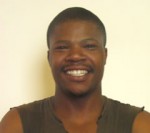TD: My name is Thando, surname Doni. I studied the training programme in 2008 and finished 2010.
I’m a Theatre maker now. I’m more into directing but I also do a bit of acting as well. I’ve got a show on at Artscape currently, as we speak […] And then I’m prepping to do Grahamstown [National Arts Festival] after that. I’ve done quite a number of shows. Been nominated for The Naledi Awards. Been nominated for The Fleur du Cap Awards. Last year, I got the Fresh Creative Award for 2016 on the Cape Town Fringe. I was the recipient of the Theatre Admin Emerging Young Director’s Bursary. I’ve done plays at the Baxter [Theatre]. Another play that I co-directed with Mandla [Mbothwe] called Ityala Lamawele also got a thing [a Silver Standard Bank Ovation Award] at Grahamstown last year. I’ve been performing, I’ve been directing for The Fleur du Cap Awards. I just did the opening ceremony of the [ASSITEJ] Cradle of Creativity this year. So, it’s been quite a lot – there’s been things happening! There’s a production I just did for ASSITEJ as well, which we’re taking to Norway later this year, in September […] The title of the production is called Phefumla. It’s work that I do with ex-convicts, [in] which we do workshops and, later on, […] we do plays. I did two productions with them. The first one was Ubuze Bam, the second one, now, was called Phefumla. The last one, we’re still travelling with it to Norway and hopefully some other places as well […] but we’ll see how it goes. I also teach. I’ve taught here at Magnet. I teach at AFDA [Film School] as well. Also in the community, I run workshops. I do a lot!
Tegan Arazny (TA) [Dialogue]: How has Magnet shaped you as a Theatre maker, director and actor?
TD: It gave me a better understanding of my craft and myself. The thing is that acting and Theatre making is all about stories, right? It’s telling stories and one can’t tell stories until one understands their story […] Magnet Theatre is quite [focused on…] the physical language and how we tell stories using the body. I use a lot of that in my work as well because what I found is that it gives space for other people that don’t understand the verbal language […] I like to do work in isiXhosa which is reclaiming our mother tongue because, for a very long time, our language has been suppressed. It has been non-existent in the Theatre world and whenever people see productions that have been done in isiXhosa they tend to look at them and see them as not being professional. And so, in my work, it is [my ambition] to reclaim that as well […] How do we take back our history? How do we find ourselves, and still find confidence, and love our mother tongue, and find space for our mother tongue to be spoken almost everywhere? Now, with the combination of that [isiXhosa language] and [telling stories with] the physical body […] a variety of different people […can] access the work. It makes them to feel not left out, which is a beautiful thing. And we also learn[ed] how to work with metaphor [at Magnet], and understand people and individuals and different stories, and how you tell those stories, and also how you get into character.
“whenever people see productions that have been done in isiXhosa they tend to look at them and see them as not being professional”
[…]

TD: It’s beautiful to see others and the others that came after us, and the others that came after those ones that came after us […] The [Theatre] universe is quite small and we see each other, we hang with each other, we are in touch with each other in terms of what we do, and how we are, and the work that we do as individuals, and the support that we keep on having amongst ourselves and other people, and the relationships that have been formed out of that […] Mandla is the director here, he was my teacher back then, but now on the production that I’m taking to Grahamstown, we’re co-directing. The production that we did, Ityala La Mawele, we were co-directing. So, there’s a sense of journey and there’s a sense of relationships being kept and how those have sort of grown from student to teacher to colleague […] to become a performer at Magnet, to become a teacher at Magnet, to direct some shows at Magnet as well. It has been quite a journey. It has been a beautiful journey which I still intend to keep moving forward and just to let it blossom and let it fly.
“It has been a beautiful journey which I still intend to keep moving forward and just to let it blossom”
TD: The reason why I think it’s important is because, for a person like me, I am where I am now because of the assistance of the training programme. It gave an insight [in]to a different world which I wasn’t really that familiar with before.
“I am where I am now because of the assistance of the training programme”
There are many, many, many other young individuals that have the same passion as me, the same dream as me, that want to see themselves where I am right now. And such programmes as the Magnet Theatre training programme, they allow that space. They really create a platform and opportunities for people that want to pursue those dreams and […] it opens doors. It’s one step into where we want to be. And such things, if they don’t exist, we are doomed.
“if they don’t exist, we are doomed”
Please click here to access Dialogue’s other posts in this series of interviews with alumni and staff of Magnet Theatre.
The Full-Time Training and Job Creation Programme receives support from TK Foundation, Rand Merchant Bank, Oppenheimer Memorial Trust, Hosken Consolidated Investments Ltd Foundation, Rolf-Stefan Nussbaum Foundation, Ampersand Foundation, Potjie Foundation, Business Arts South Africa, Western Cape Government Department of Cultural Affairs and Sports Expanded Public Works Programme, Joan St Leger Lindbergh Charitable Trust, and Distell.
Transcribed by Norah Ringma
© Dialogue Community Performance / Magnet Theatre









